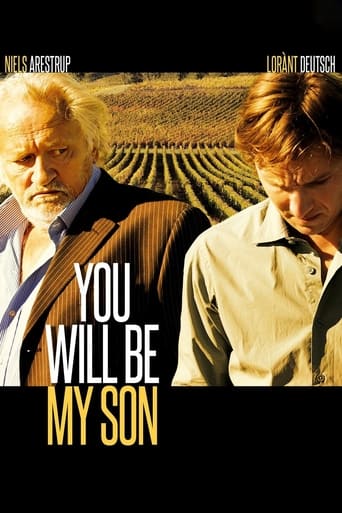paul2001sw-1
There's a grim tale well-told in 'You Will be My Son': that of an egotistical wine-maker whose love of his craft exceeds that for his son, and to such an extent that he feels under no obligation to hide it. The film pivots around these two points, indulging a sense of love for the craft of traditional wine-making, but portraying the father's behaviour in an utterly unsympathetic light. But the son is a bit too craven to be interesting: he has a mysteriously beautiful wife, and his refusal to leave, and preference to stay around and be bullied instead, is a bit mystifying; ultimately the film perhaps shares with its characters a sense that patrimony is at heart the proper way of the world. The ambiguous ending, however, is well-judged.
philipfoxe
Some excellent playing in this film which really works because its French. Some have commented on the character of the son, Martin and that he is an unsympathetic character. In Hollywood, he would have been a lovely doe-eyed sweetie pie, but this is a French movie. A son who has been constantly neglected, abused and criticised by his father is likely to be introverted, resentful and unconfident and so he is. It is to be admired that he is portrayed as flawed and uncharismatic. His loyal and loving wife keeps him going and supports him-without her he would not cope. This film, with more work, money, time etc could have been a classic, but it is still a good reason to value the French film industry.
Sindre Kaspersen
French screenwriter, producer and director Gilles Legrand's third feature film which he co-produced and co-wrote with French screenwriter and director Delphine de Vigan, premiered in France, was shot on locations in France and is a French production which was produced by producer Frédéric Brillion. It tells the story about a middle-aged Roman Catholic monarchist named Paul de Marseul who lives on a grand estate in Les Etourneaux in Nice, France where he runs a vineyard. When Paul's long-time collaborator named Francois Amelot learns that he is dying from cancer, Paul's son named Martin who works for him and lives on his estate with his wife named Alice makes himself available to take over Francois' position, but Paul doesn't regard his son that highly and is more concerned with Martin giving him a grandson. Distinctly and precisely directed by French filmmaker Gilles Legrand, this finely paced fictional tale which is narrated from multiple viewpoints though mostly from the two main characters' viewpoints, draws an increasingly dramatic portrayal of a seasoned wine maker who was sent away from home as a nine-year-old in the early 1950s to attend a Jesuit boarding school and who was noticed for the first time and trained by his father as a 17-year-old, and his relationship with his only child whom he thinks has a personality which is more compatible to that of his mother than to his. While notable for its distinct, atmospheric and naturalistic milieu depictions, masterful cinematography by French cinematographer and director Yves Angelo, reverent production design by production designer Aline Bonetto, costume design by costume designer Tess Hammami, film editing by film editor Andréa Sedlackova and use of sound, colors and light, this dialog-driven and narrative-driven story about a father's resentment towards his own flesh and blood whom he likes to dictate and taunt, depicts two conflicting and heartrending studies of character and contains a timely and prominent score by composer Armand Amar.This elegiacally atmospheric, sarcastically humorous and densely generational character piece which is set during a summer in France in the 21st century and where a French man named Philippe whom has been living in Chile for the last three years arrives at the Marseul family estate without any other reasons for his visit than to meet his father, and is embraced by his fathers' friend and associate, is impelled and reinforced by its cogent narrative structure, substantial character development, rhythmic continuity, unsentimental dialog, indifferently claiming and disowning comment by Paul : "I'm your father, aren't I", the majestic acting performance by French actor Niels Arestrup and the involving acting performances by French actors Lorànt Deutsch, Nicolas Bridet, Patrick Chesnais and French actress Anne Marivin. An eloquently psychological, commandingly cinematographic and revering narrative feature.
richard-1787
I found this movie aggravating. The head of a French vineyard constantly belittles his son - near the end, we find out that it is at least in part because the father lost his wife in part because of his son's ill health. The father eventually favors the son of his foreman. But the son is not presented in a sympathetic way, and though his situation is unfair, we never get a chance to really feel for him.The acting is all fine, and some of the shots of Provence are wonderful. There were the makings here of a much better movie, but that would have required rethinking the script, and therefore probably finding a better director.----------------------------I watched this movie again this evening, and that gave me no reason to improve my previous opinion of it. The only reason this movie works at all is because the lead, Niels Arestrup, has so much charisma, that you remain interested in his thoroughly disagreeable character despite his many flaws; had a less charismatic actor played the role, the character would have been so hard to stomach that I doubt anyone would have sat through the movie.On the other hand, Lorànt Deutsch, who plays his son, comes across as having no charisma whatsoever. (What makes his extremely attractive and intelligent wife stay with him the movie never begins to make clear.) As a result, it is very hard to feel sorry for him, even through his father treats him like dirt for no good reason.This is just a dissatisfying movie. A shame, because there were the makings of an interesting story here.


